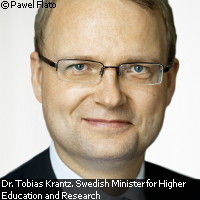Swedish EU presidency to promote innovation and ERA
The Swedish presidency of the Council of the European Union begins on 1 July and will continue to the end of 2009. The new presidency's work programme has been published, clearly outlining its priorities over the next six months. In addition to tackling the urgent challenges of economy, employment and climate (they will work towards the adoption of a new climate agreement during the international climate negotiations in Copenhagen in December), the work programme stresses strengthening competitiveness by investing in research and education as well as improving the governance of the European Research Area (ERA). Dr Tobias Krantz, Swedish Minister for Higher Education and Research, said, 'It is my conviction that the economic, ecological and social challenges now facing Europe will benefit from being dealt with not just as problems, but also as opportunities. Crises can generate creative processes that ultimately lead to something new and better.' Speaking on enhancing the governance of the ERA, Dr Krantz emphasised the importance of 'carefully considered' cooperation between Member States, the European Commission, universities, research institutions and industry in realising the vision of the ERA in 2020. The vision of the ERA is to improve European competitiveness in science and technology by facilitating researcher mobility, improving their access to world-class infrastructures, opening up European, national and regional research programmes and strengthening global research partnerships. 'The question is how we can see things through to achieve our common goals,' said Dr Krantz. The presidency plans to continue the work that has begun on the ERA, and to 'propose governance mechanisms for the effective use of these resources and better cooperation between policy areas'. Implementation of the ERA has so far met strong national and institutional barriers. The Swedish EU presidency coincides with a review of the Seventh Framework Programme (FP7). Ensuring that the direction of forthcoming programmes for research and development is best positioned to respond to future challenges in health, energy and climate is another of the presidency's goals. 'The focus will be on how the EU is to use its research resources more efficiently,' the work programme reads. 'The objective is to agree on what research resources should be used for and how these investments could be better coordinated and managed. One important issue is the design of joint initiatives at European level, including the EU Framework Programme for Research.' According to Jesper Wadensjö of the Swedish Research Council, 'The countries and citizens of Europe are facing new global changes which represent difficult environmental, economic and social challenges. The need for research-based knowledge has never been greater.' The role of research and innovation in helping to lift Europe out of the current economic crisis is highlighted in the Swedish work programme, which points out that 'research and innovation create new development areas'. According to the document, 'The Presidency will submit a contribution to a European Innovation Plan, with links to the European Research Area.' The presidency plans to help Baltic Sea Member States to manage the serious environmental problems they face and to encourage growth and development in that region. Part of this means fostering larger joint initiatives in the areas of research, innovation and entrepreneurship. In addition, the new presidency will address the importance of transferring technologies to poorer nations as part of an effort to limit greenhouse gas emissions. 'Regulatory frameworks should be adapted to promote the spread of climate-friendly technology, particularly to developing countries,' the work programme reads. The Swedish presidency of the Council of the EU will host a conference on the role of research and innovation in the development of Europe up to 2025 called 'New Worlds - New Solutions - Research and Innovation as a Basis for Developing Europe in a Global Context' next week in Lund, Sweden.
Countries
Sweden



